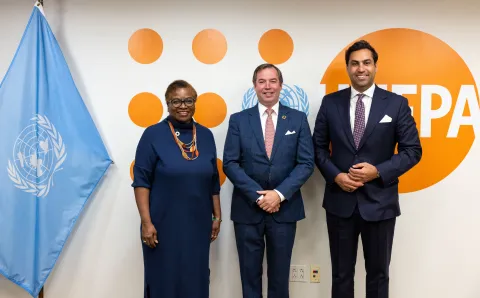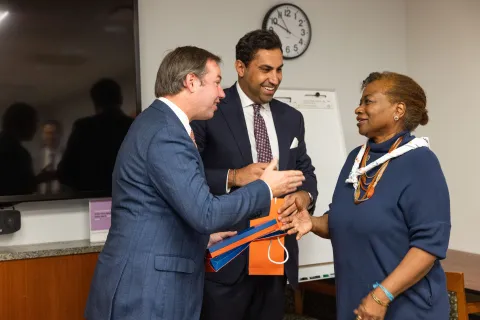World Scouting and UNFPA’s new global partnership to empower youth leadership through health, peacebuilding, and education initiatives

New agreement will help power World Scouting’s new Health and Wellbeing initiatives, drive youth-led advocacy on comprehensive health education, and connect UNFPA’s country offices with National Scout Organizations.
World Scouting leadership met with the UN Population Fund’s (UNFPA) Executive Director, Dr Natalia Kanem, and her leadership team at the UN General Assembly in New York this week to discuss the new partnership, which focuses on empowering adolescent girls and marginalised youth through technical support, global advocacy, and youth leadership.
HRH Prince Guillaume of Luxembourg, Board Member of the World Scout Foundation, and Ahmad Alhendawi, Secretary General of World Scouting, attended the meeting on the sidelines of the UN Summit of the Future. The partnership takes global-level cooperation to a new level and builds on decades of national and regional collaboration, including initiatives mobilising young people to respond to the impacts of the COVID-19 pandemic, the role of young people in informing approaches to gender-based violence, and championing healthier lives.

During the meeting, Dr. Natalia Kanem spoke about the role of Scouting in providing a ‘beacon of hope’ for young people facing, crisis, challenges, and a sense of powerlessness. She reflected that Scouting’s model of volunteerism, agency, and support to communities is central to delivering a fairer, more equal, just, and peaceful world.
A key aspect of this partnership is Scouting's role in advancing the Cotonou Youth Action Agenda by empowering young people through non-formal education, fostering leadership, and supporting community-based projects. The agenda focuses on sexual and reproductive health and rights, gender equality and human rights, quality education and economic empowerment, climate action and crisis resilience, and youth leadership and participation.
The new partnership focuses on providing technical and programmatic support to empower youth and advance World Scouting’s new Health and Wellbeing initiative, HealthAllies, specifically in the areas of sexual and reproductive health, gender equality, and youth leadership.
It will strengthen global advocacy efforts for non-formal education, youth inclusion, and girls' empowerment, ensuring marginalised youth have access to leadership opportunities. The collaboration also aims to promote youth participation in crisis response, peacebuilding, and climate action with a focus on resilience, mental health, and fostering global partnerships that align with World Scouting’s Health and Wellbeing initiative.
About World Scouting
Scouting is the world’s leading educational youth movement, engaging millions of young people to be active citizens and create positive change in their communities. The Scout Movement engages more than 57 million Scouts connected through a membership network of 176 National Scout Organizations. For more information, visit scout.org.
The World Scout Foundation strives to develop and strengthen the impact of Scouting by providing financial support and other resources to World Scouting. For more information, visit worldscoutfoundation.org.
About UNFPA
UNFPA is the United Nations sexual and reproductive health agency. Our mission is to deliver a world where every pregnancy is wanted, every childbirth is safe and every young person's potential is fulfilled.
We promote gender equality and empower women, girls and young people to take control of their bodies and their futures. We work with partners in more than 150 countries to provide access to a wide range of sexual and reproductive health services. Our goal is ending unmet need for family planning, preventable maternal death, and gender-based violence and harmful practices including child marriage and female genital mutilation by 2030.